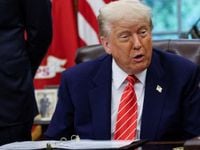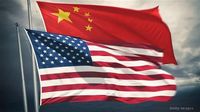On Thursday, May 8, 2025, U.S. stocks surged in midday trading, with the Dow Jones Industrial Average climbing over 500 points, reflecting a positive market response to recent economic developments. The Dow rose by 567.16 points, or 1.38%, closing at 41,681.13. The Nasdaq increased by 310.27 points, or 1.75%, to finish at 18,048.43, while the S&P 500 gained 76.45 points, or 1.36%, ending at 5,707.73.
President Trump announced a significant trade agreement framework with the United Kingdom, marking the first major agreement since he implemented what he calls "reciprocal tariffs". During a press conference held at 10 a.m. Eastern Time, Trump revealed that the U.S. would impose a 10% tariff on U.K. goods, generating an anticipated $60 billion in foreign tax revenue. He emphasized that this agreement aims to protect the U.S. steel industry, a critical sector for both nations.
UK Prime Minister Keir Starmer expressed optimism about the agreement, stating it would enhance U.S.-UK trade, create jobs, and hold particular importance for the auto and steel industries. Starmer remarked, "This agreement will promote U.S.-UK trade, protect and create jobs, and is significant for the auto and steel industries." Trump reiterated the U.K. as one of his most valued allies, while Starmer highlighted the strong historical ties between the two nations.
In addition to the agreement with the U.K., Trump mentioned a forthcoming deal with Ukraine regarding rare earth elements, indicating a broader strategy to strengthen U.S. economic ties globally. He is scheduled to meet with Ukrainian President Volodymyr Zelenskyy soon to discuss this initiative.
As high-level U.S.-China trade talks are set to take place over the weekend, economists are cautious about the potential outcomes. Trump believes the meeting will be amicable and suggested that tariffs on China are unlikely to exceed the current 145% level, with a possibility of reduction. Chinese Vice Premier He Lifeng and U.S. Treasury Secretary Janet Yellen will meet in Switzerland, a move seen as a crucial step in addressing the ongoing trade tensions.
However, the Chinese Ministry of Commerce has made it clear that the U.S. must approach negotiations with sincerity and a willingness to correct its previous mistakes, including the cancellation of unilateral tariffs. A spokesperson stated, "If the U.S. continues to act unilaterally and attempts to use negotiations as a facade for coercion, China will not agree and will not sacrifice its principles or international fairness to reach any agreement."
Meanwhile, the U.S. labor market showed signs of resilience, with the number of Americans applying for unemployment benefits falling last week. Initial claims decreased by 13,000 to 228,000 for the week ending May 3, 2025, aligning closely with economists' forecasts. Continuing claims also dropped to 1.88 million, indicating limited layoffs despite the economic uncertainties stemming from tariffs and the Trump administration's fiscal policies.
However, the U.S. productivity rate experienced its first decline since 2022, with labor productivity falling by 0.8% in the first quarter of 2025. This decrease, attributed to a drop in economic output, ended a streak of efficiency gains that had previously helped mitigate rising employment costs associated with inflation. Unit labor costs saw a significant jump of 5.7%, marking the largest increase in a year and raising concerns about long-term inflationary pressures.
Federal Reserve Chairman Jerome Powell, following the Fed's decision to maintain interest rates, acknowledged that the current tariff policies have had a more substantial impact on the economy than previously anticipated. He warned that if tariffs remain unchanged, the U.S. could face slower economic growth, rising long-term inflation, and increased unemployment rates. Powell stated, "The ability to avoid sustained inflation will depend on the scale and timing of tariffs, as well as public expectations regarding inflation."
Seema Shah, Chief Global Strategist at Principal Global Investors, noted that the Fed is in a challenging position, as its dual mandate of maximizing employment and stabilizing prices may be difficult to achieve under current conditions. She pointed out that the uncertainty surrounding Trump's policies is likely to dictate the timing and extent of necessary adjustments. Shah remarked, "In this situation, the Fed may have to remain on hold, with rate cuts becoming essential, but it seems the opportunity for that may not arise until late in the third quarter."
In the stock market, notable movements included ARM Holdings, which provided disappointing earnings guidance, while AppLovin Corporation exceeded expectations in its first-quarter performance and agreed to sell its gaming division.
As the U.S. and U.K. prepare to finalize their tariff agreement, discussions are also ongoing with other nations, including India and Israel, as the Trump administration seeks to reshape global trade dynamics. The U.K., as the largest single trading partner of the U.S., relies heavily on this relationship, with nearly £200 billion worth of British exports heading to the American market last year. With a significant portion of these exports in the automotive and pharmaceutical sectors, any tariff exemptions could have a profound impact on both economies.
Overall, the developments in U.S. trade policy and its implications for the global economy continue to unfold, as investors and policymakers alike monitor the outcomes of upcoming negotiations and their potential effects on inflation and employment rates.






